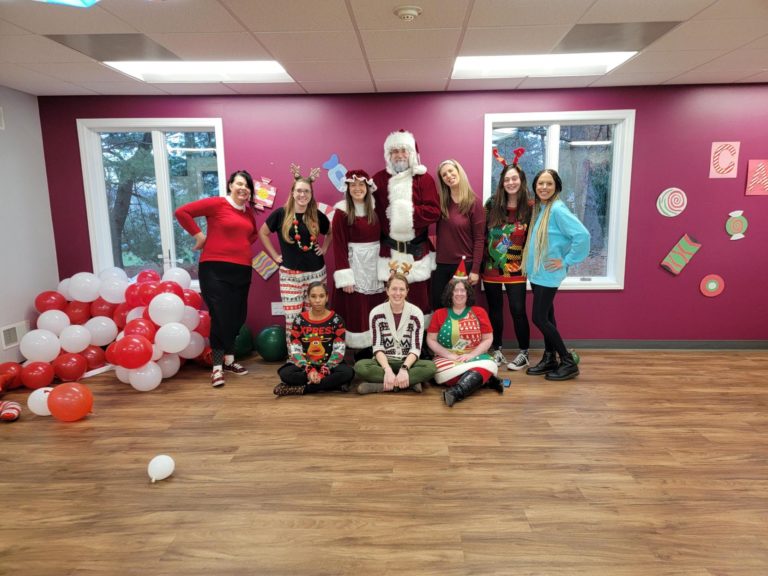The holidays can be both a magical and stressful time. Along with the regular holiday stress that accompanies decorating, shopping, and cooking, families that have a child with autism may encounter additional challenges. Some challenges that may affect a child with ASD are sensory issues, disruptions of routine, and traveling to less familiar locations. The good news is we have tips that can help minimize these challenges and decrease the stress related to the holiday season.
One general tip for parents to keep in mind when celebrating the holidays beside your child with autism is to not force consistency and generalization of skills… It’s okay to take a step back for the holidays. Holiday moments are meant to be enjoyed by both parents and children, so don’t feel guilty for straying away from the daily routine, not following through with a demand, or not pushing your child to try new food. Below are some more tips to help decrease stress and maximize the enjoyment of the holiday season!

Sensory Issues
Christmas decorations, jingle bells, and gingerbread scents are just a few examples of the sights, sounds, and smells that may be overwhelming for your child with autism. Since these elements are a big part of the holiday season, it is important to find a balance between providing your child the holiday enjoyment, while decreasing the chance of them experiencing a sensory overload. While a simple solution is to avoid any sensory challenges, there are other options that would allow your child a holiday experience without the sensory overload!
- Decrease unnecessary sensory challenges. A Christmas shopping trip may be easier during off-peak hours when stores are less crowded. Another option is having a smaller list of Christmas to-do’s that incorporates visuals for your child to follow along!
- Explore sensory-friendly activities. There has been an increase in the number of local sensory friendly events, which replace twinkling lights with gently changing lights or minimize the crowd size for visits with Santa!
- Establish a back-up plans in case of sensory overload. If a crowded holiday event becomes challenging for your child, have a back-up plan to leave for a quiet drive of seeing the neighborhood Christmas lights.
Disruptions in Routine
Many kids with autism may prefer consistent or predictable situations, which is not always the theme of the holidays. Minimizing the fallout from routine disruptions can be done with a little strategy. Picking and choosing holiday activities that are easiest on your child or preparing your them beforehand for the new sights, sounds, smells, and people are two good starts!
- Be selective. Your child may be able to handle some routine changes but picking activities that are easier on your child with autism can decrease routine issues. Select activities that interest your child and that fit into their schedule. If an evening trip to see Santa does not fit into your child’s routine, try a morning visit! Also remember, sitting out events is perfectly acceptable.
- Prepare and Practice. Preparing your child for upcoming Christmas traditions is important. Speak with them in advance about the changes associated with holidays such as decorations. Practicing behaviors ahead of an event is another key strategy.
Traveling to Unfamiliar Locations
Holidays may include traveling to visit family. Your child with autism may have challenges adjusting to an unfamiliar location, so incorporate other traditional elements from their routine into the trip. Also establish back-up plans to calm environment when your child is overwhelmed.
- Be deliberate about packing. Pack a bag of your child’s favorite toys or comfort items. Include any electronics your child may need for the trip and include the chargers for those devices.
- Keep elements of normalcy. If your child has food or snacks that they consistently eat, remember to bring those. Any visuals used at home that help your child to understand the schedule should also be packed.
- Pre-plan and stick to that plan. Designate a quiet space for your child with ASD, even if you’re at a family/friend’s home. Sharing your child’s needs with hosts may help eliminate the stress of the trip and prepare the host to accommodate your family.
Enjoy the Holidays
When approaching the holidays, remember to minimize demands by determining what matters. Low demands lead to more choices for your child! Below are some tips to help you stay calm and happy during the holidays.
- Keep things simple.
- Decrease the stress and increase the enjoyment for you and your entire family.
- Establish your own traditions that are easy and fun for your child with autism.
- Plan quiet time with the immediate family to help you and your child relax.
- Don’t forget to take care of yourself too.
The holidays can be a bit chaotic and cause changes in the schedules that children rely on. By preparing with your child’s regular items, it helps to provide constant and predictable details to the day. You can always work to get back on track after the gatherings are over.
If you’re not sure what items or visuals would be most helpful for your child, don’t hesitate to reach out to your child’s BCBA. They would LOVE to help prepare for fun holiday events.
